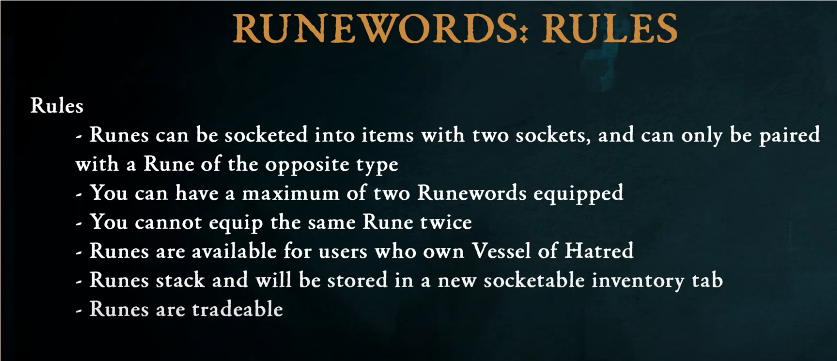Diablo 4 Runewords Rules: Understanding the Mechanics of Rune Customization
In Diablo 4, the Runewords system is a powerful tool that allows players to customize their abilities by combining different Runes. However, to effectively use this system, it’s essential to understand the specific rules that govern how Runes and Runewords work. This article will guide you through the key rules of the Runewords system, ensuring that you can maximize the potential of your character in the world of Sanctuary.

The Basics of Socketing Runes
Runes can be socketed into items with two sockets: This is the foundational mechanic of the Runewords system. To create a Runeword, you must socket two Runes into an item that has exactly two sockets. The items that can typically house Runewords include Chest, Leg, and Two-Handed weapon slots, as well as the Helm slot, which has received an additional socket to accommodate Runewords.
Pairing Runes of Opposite Types: Runes come in two types—Ritual Runes and Invocation Runes. A key rule in the Runewords system is that you can only pair a Rune of one type with a Rune of the opposite type. For example, if you socket a Ritual Rune into an item, the second socket must be filled with an Invocation Rune to complete the Runeword.
Limitations and Restrictions
Maximum of Two Runewords Equipped: Players can equip a maximum of two Runewords at any given time. This limitation ensures that while you can benefit from powerful custom abilities, you’ll need to carefully select which Runewords best complement your playstyle and build.
No Duplicate Runes: Another important rule is that you cannot equip the same Rune twice. This restriction applies to both the individual Runes within a Runeword and across different Runewords. Each Rune you use must be unique, adding a layer of strategy in choosing and pairing Runes.
Availability and Inventory Management
Vessel of Hatred Expansion Requirement: Runes and the ability to create Runewords are exclusive to players who own the Vessel of Hatred Expansion. Without this expansion, players cannot access the Runewords system, making it a key component of advanced gameplay in Diablo 4.
Rune Stacking and Storage: To manage your collection of Runes effectively, the game provides a socketable inventory tab where Runes can be stacked. This makes it easier to organize and access your Runes, especially as you gather multiple Runes of the same type or different rarities.
Trading and Strategic Use
Runes Are Tradeable: One of the most exciting aspects of Runes is that they are tradeable. This opens up a wealth of opportunities for players to exchange Runes with others, helping them complete their desired Runeword combinations or acquire specific Runes that are difficult to find. Trading can be an essential part of optimizing your character, especially as you seek out rare and powerful Runes.
Conclusion
Understanding the rules of the Runewords system in Diablo 4 is crucial for maximizing your character’s potential. By knowing how to properly socket Runes, managing the limitations on Runewords, and taking advantage of trade opportunities, you can create powerful custom abilities that enhance your gameplay experience. Whether you’re new to Runewords or a seasoned player, these rules will help you navigate the system effectively, ensuring that you’re always ready to face the challenges that await in Sanctuary.
Similar Posts
- EA Sports College Football 25 Guide – How to Farm Coins
- PoE Burning Arrow of Vigour Build 3.25 – Path of Exile: Settlers of Kalguur
- PoE Spirit of War – Path of Exile
- PoE Intimidating Cry Build 3.25 – Path of Exile: Settlers of Kalguur
- PoE Tawhoa’s Felling: Tawhoa’s Chosen – Path of Exile
- PoE Endgame Changes & Improvements 3.25 – Path of Exile
- Governor of Poker 3: Blackjack – Know the Odds Before You Play
- College Football 25: Crafting the Ultimate Coach in Dynasty Mode
- PoE Defiance Banner Build 3.25 – Path of Exile: Settlers of Kalguur
- PoE Armageddon Brand Build 3.25 – Path of Exile: Settlers of Kalguur
- PoE Level 20 Barkskin Skill – Path of Exile
- PoE Completing the Sanctified Scarabs I Challenge
- PoE Crusader Anoint – Path of Exile
- PoE Sun Rune – Path of Exile
- PoE Selective Precision Anoint – Path of Exile